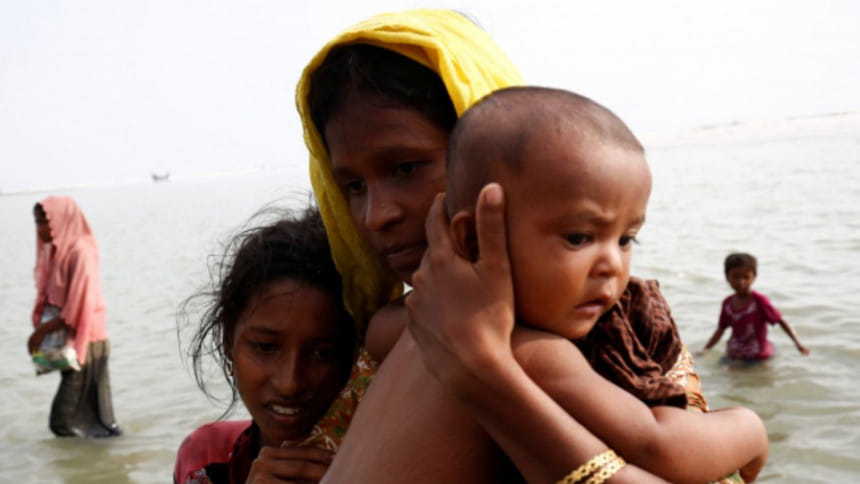Why bilateral initiatives with Myanmar have failed

Bangladesh, the largest destination for Rohingya refugees, has, by far, received a large number of Rohingyas since 1978 in four phases—before the 1990s, after the 1990s, post-2012, and post-2017. The United Nations High Commissioner for Refugees (UNHCR) in 2017 reported that an estimated 200,000 to 500,000 undocumented and 33,000 registered Rohingya refugees had been living in Bangladesh. In the aftermath of the post-2017 Rohingya crisis, the government of Bangladesh permitted an additional 700,000 Rohingyas to take shelter in Bangladesh until their safe return to Myanmar.
In the wake of continuous influx of such large numbers of Rohingyas, the government of Bangladesh has long been pursuing Myanmar for a peaceful and sustainable solution of the Rohingya crisis. Bangladesh has been engaged in constant dialogues with Myanmar for resolving the crisis. For instance, Bangladesh signed a deal with Myanmar on November 23, 2017 for the possible repatriation of thousands of Rohingya refugees. Both countries also formed the 30-member Joint Working Group (JWG) on December 19, 2017 (15 from each country) for the safe return of forcibly displaced Rohingyas. However, despite all these deals and agreements, no tangible progress has yet been observed on finding a permanent solution to the crisis.
First, Myanmar's stubborn position against granting citizenship rights to Rohingyas has stalled the successful repatriation of these refugees from Bangladesh to Myanmar. On the subject of repatriation, Myanmar only agreed to accept Rohingyas as "foreigners" or "Bengali Muslim citizens," not as the country's ethnic group. According to this policy, Myanmar instructed all Rohingyas to register as "Bengalis" in 2014, thereby effectively excluding them from the national census. For instance, Myanmar's former Foreign Minister U Nyan Win once remarked, "[SPDC] is willing to accept the return of refugees from Myanmar if they are listed as Bengali Muslim minorities but not if they are Rohingyas, because Rohingyas are not Myanmar citizens."
This step of the Myanmar government has, in fact, intensified the crisis and made its willingness on bilateral negotiations deeply questionable. If Rohingya refugees are to be repatriated from a host country such as Bangladesh, how is it justifiable to enlist them as "Bengalis" or "foreigners"? And how can we call it "repatriation"? Thus, the terms and conditions imposed by the government of Myanmar upon Rohingya refugees by identifying or enlisting them as citizens of a host country are completely absurd.
Second, Myanmar's strategy of only accepting "verified refugees" through the verification process creates another challenge to the successful return of Rohingyas from Bangladesh to Myanmar. The requirements of "citizenship verification" include copies of expired citizenship cards or national registration cards and documents of the residence of Rohingyas' ancestors in Myanmar. According to Amnesty International, it is "deeply problematic" to demand that Rohingyas prove their residency with documents, when they were removed from the official residency lists and never allowed to receive new identity cards under the 1982 Citizenship Law. Amnesty International also reports that Rohingyas, who were citizens under the 1948 Citizenship Act, never received new identity cards created under the 1982 Citizenship Law of Myanmar.
Amnesty International's research conducted since 2012 finds the "deliberate and arbitrary deprivation of valid documentation," which has actively been done by Myanmar authorities to intentionally deprive Rohingyas of citizenship documentation. Now, the matter of concern is that without proof of residence, as per the conditions imposed by Myanmar, Rohingyas will neither be eligible for citizenship in Myanmar nor will they be able to return to the Rakhine State. Such conditions are nothing but virtually impossible for Rohingyas to meet in order to return to their homeland.
Third, the problematic citizenship verification process under National Verification Cards (NVCs), a temporary identification card issued by Myanmar in July 2014 to verify citizenship claims, further complicates the procedure of Rohingyas' repatriation, as it does not guarantee citizenship in Myanmar, rather requires Rohingyas to be identified as "Bengali" on the application form. Rohingya community leaders and international human rights organisations have criticised the ID card system. Many Rohingyas have already refused to apply for the NVCs and have also reflected their unwillingness to go back to Myanmar without ensuring citizenship and other rights.
Fourth, the absence of a congenial environment in the Rakhine State for the safe and dignified return of Rohingya refugees remains another key challenge. For example, when the repatriation of the first batch of 2,200 refugees was about to start officially on November 15, 2018, as per the bilateral deal and agreement, none of these refugees agreed to return to their place of origin for the fear of fresh persecution by Myanmar's military junta. Amid their protests and unwillingness to return, Bangladesh, thus, cancelled the repatriation of the first batch of Rohingyas. As a responsible member of the international community, Bangladesh has always vowed the safe and voluntary return of Rohingyas to whom the country has given shelter in its territory since 1978.
These are some of the reasons why bilateral initiatives with Myanmar have not been effective in dealing with the Rohingya crisis. The Rohingya refugee crisis, unfortunately, is bound to continue unless Myanmar actively engages in bilateral cooperation with Bangladesh and abandons its policy of systemic exclusion of Rohingyas and ensures a safe environment for them.
Sultana Yesmin is a PhD candidate at the School of Politics and International Studies (SPIS), Central China Normal University, Wuhan, Hubei, China.
Email: [email protected]

 For all latest news, follow The Daily Star's Google News channel.
For all latest news, follow The Daily Star's Google News channel. 



Comments